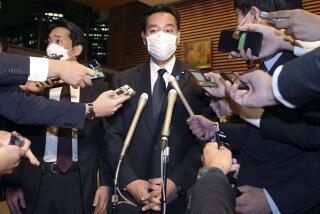Japan’s prime minister says he will resign
- Share via
Japanese Prime Minister Yukio Hatoyama ended weeks of internal discontent with his leadership by announcing Wednesday that he would resign, a swift fall from grace for a politician who just eight months ago led his endemic opposition party to a historic victory.
His collapse in approval ratings was prompted largely by his failure to deliver on a campaign promise to move a major U.S. military base off Okinawa’s main island. The move was a centerpiece of Hatoyama’s campaign for office last year, but its implementation would have required American consent to alter a painstakingly negotiated 2006 deal with the previous Japanese government before the base could be moved to another part of Okinawa.
The U.S. military has been ensconced in the Marine Corps Air Station Futenma on Okinawa since the end of World War II. Home to most of the 47,000 military and civilian personnel in Japan, the base remains crucial to Marine operations in the Pacific. But the accompanying noise and disruption have created a deep current of opposition from many Okinawans.
In elections last year, Hatoyama’s pledge to move the base off the island was part of a broader agenda to give Japan more say over security matters in its alliance with the U.S. It struck a chord not only with Okinawans, who contend the base’s intrusion on their lives is ignored by politicians in Washington and Tokyo, but also with those Japanese leery at how the U.S. alliance has dragged Japan into conflicts in Iraq and Afghanistan.
During the campaign, Hatoyama had mused about the importance of weaning Japan from its dependency on the U.S. for security, suggesting that the country’s future lay in a deeper integration with Asia. He also promised to remake Japanese politics by curbing the power of the bureaucracy, which — with its allies in business — has resisted taking direction from elected politicians.
Hatoyama’s meteoric fall illustrates the enduring strength of the status quo in Japan.
Once in office, he was unable to push the security establishment into reopening the Okinawa deal. His perceived dithering in delivering on his promise came to be seen as the symbol of a waffling leadership style. After months of failed efforts to persuade the Obama administration to revisit the arrangement, Hatoyama was forced to concede last week that he could not fulfill his promise.
The admission cost him the support of a small leftist partner in his three-party coalition and prompted a popular outcry from critics and commentators.
Polls showed Hatoyama’s popularity dipping below 20%. And they showed the governing party sliding into a statistical draw with the Liberal Democratic Party, the political behemoth that had ruled Japan for most of the postwar era but that had grown increasingly sclerotic in power before being toppled last year.
Although the loss of its coalition partner did not threaten the government’s hold on power in the lower house of parliament, it spooked members of the ruling Democratic Party of Japan, who face elections for the upper house in July.
The governing party was also beset by financial scandals that engulfed Ichiro Ozawa, its second-most senior figure and its political brain.
Hatoyama said Wednesday that Ozawa would also resign, declaring the move an opportunity to clean up Japan’s notoriously corrupt politics.
Succession speculation focused on Finance Minister Naoto Kan, a fiscal conservative who has been more open to tax measures that could help reduce Japan’s high public debt.
Foreign Editor Bruce Wallace is former Tokyo bureau chief for the Los Angeles Times.
More to Read
Sign up for Essential California
The most important California stories and recommendations in your inbox every morning.
You may occasionally receive promotional content from the Los Angeles Times.













